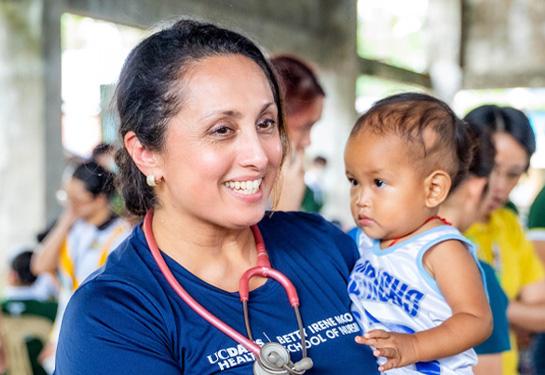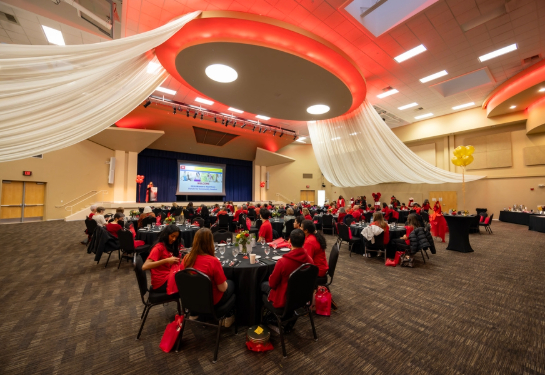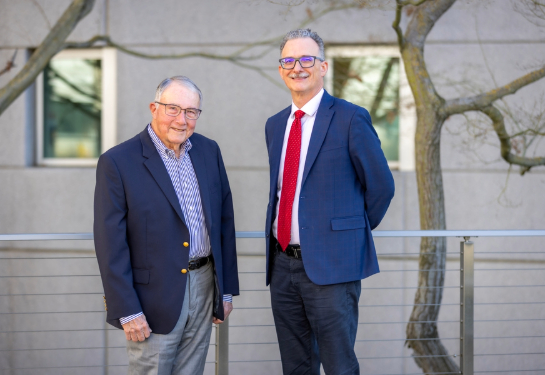‘I got Davis!’ Match Day places medical students into residency programs
More than 100 fourth-year students learned Friday where they’ll head for training after graduation
A couple of minutes before 9 a.m. Friday, UC Davis fourth-year medical student Treysi Vargas received an email that would alter her family life — for better or worse.
The email, from the National Resident Matching Program, would tell Vargas if she would stay at UC Davis for her OB-GYN training the next four years, or move as far as Chicago. Her husband Maarouf Saad is planted at UC Davis Health for several years, training in orthopaedics. He massaged Vargas’ neck while waiting to read the email together, surrounded by several friends.
“I am feeling super anxious,” she said at a friend’s home near the medical school. “We’ll see what happens.”
Vargas clicked open the email, let out a scream and kissed her husband. “I got Davis!”
She was among the 115 UC Davis medical students — and tens of thousands from across the country — who simultaneously learned where they’ll attend residency training after graduation this spring. For decades, UC Davis students would open a personalized envelope at their school on the third Friday in March to learn where they matched. But since the coronavirus pandemic, the students have taken part from homes, surrounded by friends and family, while logged into a Zoom meeting with all their classmates.
Residency is an intensive training program that lasts anywhere from three to seven years, depending on the medical specialty. It’s a necessary step on the path to becoming a board-certified physician and Match Day is an unforgettable part of the long journey.
“This is amazing!” Vargas said. “My husband is a resident here at Davis so being able to stay together was extremely important to me.” They got married just six months ago. "And also,” she added, “I know I’ll get amazing training here at UC Davis.”
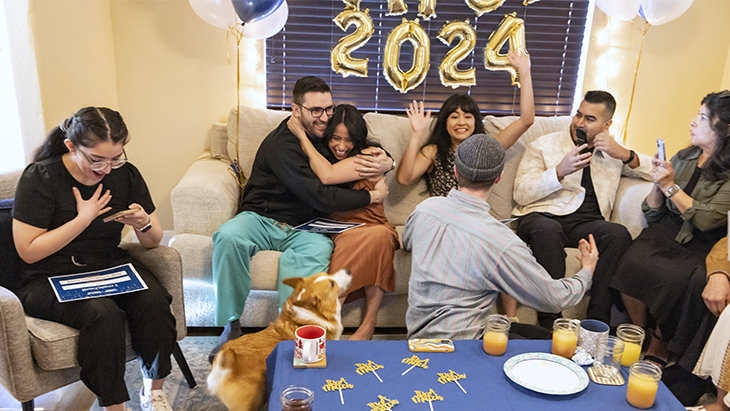
There’s a doctor (or five) in the house
Sirjan Mor was waiting in a living room decorated with shiny foil balloons and banners. Donuts and coffee cups covered the kitchen table, but Mor and her classmates didn’t need more caffeine. Pacing around the Sacramento home, they were already running on nerves.
“This is basically the day that we worked so hard for all through med school,” she said. “There’s a lot of hopes, dreams and expectations attached to this day.”
The aspiring neurosurgeon was joined by classmates Sylvia Cruz, Emmanuel Gaeta and Eric Robles on this Match Day. A handful of parents and friends were also there for the big moment.
“I’ll be refreshing my e-mail and hopefully I’ll get UC Davis. I want to stay here for anesthesiology,” Robles said.
The students’ fingers hovered over their smart phones in anticipation at 9:00 a.m. sharp. But two minutes ahead of schedule, the tension in the room was pierced by a gasp from Cruz.
“We’re staying!” she shouted, excitedly.
Friends and family cheered. Cruz hugged her fiancé, a University of Toledo medical student who had flown to Sacramento to celebrate together — and learned he also matched into UC Davis. Theirs is called a “couples match,” as the two students had linked their residency choices and sought to be placed together in the same geographic area.
Mor matched into neurosurgery, Cruz into general surgery, and Robles into anesthesiology — all at UC Davis. Gaeta matched into general surgery at the University of Illinois, Peoria.
Proud parents snapped photos of their newly matched students, who posed proudly while holding celebratory signs and balloons. The balloons read, “There’s a doctor in the house.”
Summer Meyer and Pooja Patel: Nerves turn into excitement
It was a morning that started with a lot of nervous energy that turned into jubilant excitement for Summer Meyer and Pooja Patel.
The two roommates anxiously sat at their computers counting down to 9 a.m., as they eagerly waited to hear where they would spend the next four years.
“I got it, I got the email,” Meyer called out, as she turned to her fiancé Matt. “Should I open it?”
Matt and Meyer’s mother gathered behind her as she opened the email on her computer.
“I got Davis!” Meyer exclaimed.
Meyer, who will train in dermatology, hugged Matt and then turned to embrace her mother.
“I am so grateful to match at UC Davis,” declared Meyer. “Dermatology is such a challenging field, and I am thrilled to have matched at a program that is near and dear to my heart.”
Patel matched with Oregon Health & Science University (OHSU) in internal medicine.
“I have always wanted to be a physician and I am incredibly grateful to match with OHSU, who will do an excellent job of training me to achieve my dream.”
To cap off the morning, Meyer and Patel sipped mimosas and visited with their families.
“We are so happy to have our families here with us today,” they both shared. “We could not have done this without them.”
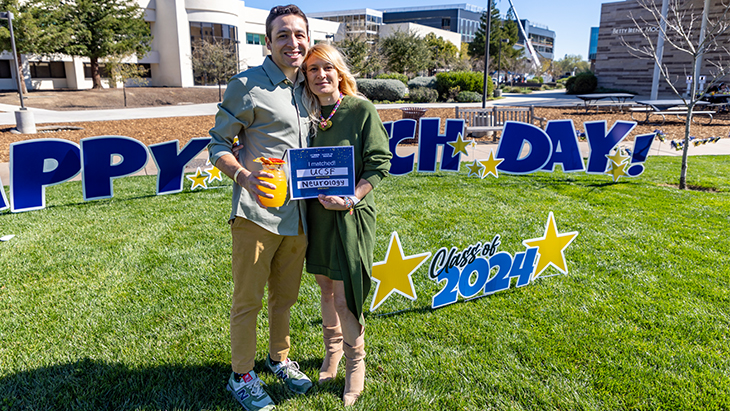
The inner workings of the matchmaker
Medical students spend part of their final year in school deciding which specialty field and training program to pursue. They gain patient-care experience at various academic medical centers, hospitals and clinics and attend interviews with residency program directors. Then they make a ranked list of the locations they’d like to train at following graduation.
Some students submit several choices. Others pick dozens. Their lists are entered into the database of the National Resident Matching Program.
Training site leaders also submit a ranked list of students they’re interested in hiring as residents. A computer plays matchmaker for about 37,000 positions.
Students, and the training sites, have no idea who will match where, until 9 a.m. PDT, when the incoming emails start to buzz and beep across the country.
“It’s really an anxiety-provoking time,” said Sharad Jain, the UC Davis associate dean of students. “You’ve been working at this for four long years and suddenly it all comes together in that one moment.”
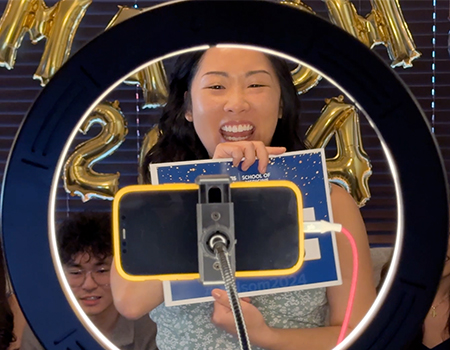
Nearly a quarter of the matched students, 24%, will stay at UC Davis School of Medicine. Many of them will train in the medical center and some will be assigned to Federally Qualified Health Centers, where they’ll care for underserved patients.
A total of 81% will remain in California, and 54% will train in primary care, such as internal medicine and family medicine. These are specialty areas that are in short supply in places like Sacramento and throughout the Central Valley.
“We really value the importance of our workforce mission at UC Davis, so we’re thrilled when our students are going to stay here and take care of the people of our state… and address those workforce shortages,” Jain said.
Celebration on campus
After students learned of their matches at home, they went to their school campus in Sacramento to celebrate with classmates.
Among the crowd that gathered at Vanderhoef Lawn was Reza Taghavi, who matched at OHSU in interventional radiology. It’s a specialty whose doctors use advanced imaging technology to guide minimally invasive procedures for a broad range of conditions, such as vascular diseases, targeted cancer therapies and treatment of fractured vertebrae.
The specialty makes a lot of sense for Taghavi, because imaging and procedures rely on advanced technolgy, a field he used to work in during his previous career with Amazon in Silicon Valley.
He looks forward to moving to Portland, where he’s heard positive reviews about the coffee and beer scenes.
“I’ve never lived out of California so it’s nice to go out and expand my horizons,” he said.
Pamela Wu and Liam Connolly contributed to this story.

